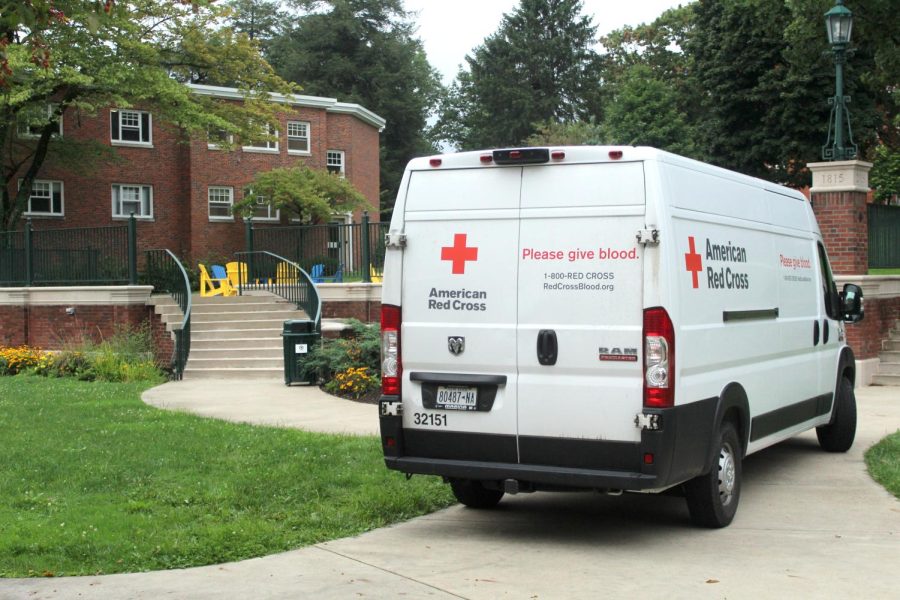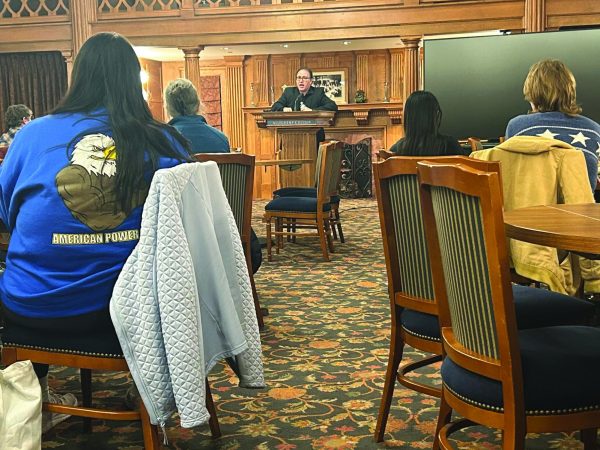Fiji hosts blood drive with Red Cross
Schultz Banquet Hall hosted an unusual sight on the afternoon of Tuesday, September 6. In the middle of the banquet hall, comfortable-looking leather beds were surrounded by medical equipment and defended with privacy screens. Directly in front of them were brothers from Allegheny’s chapter of the Phi Gamma Delta fraternity, who were taking down patron details and information and handing out informational pamphlets on donating blood.
This tableau was FIJI’s first blood drive of the year, hosted in coordination with the American Red Cross. The fraternity is planning to hold three more drives throughout this academic year.
“This is an event we host twice a semester to help keep up with (the Red Cross’s) demand (for) blood and our interaction with the Red Cross as well,” said FIJI brother Andreas Vukas, ’24, as he welcomed prospective donors toward the end of the drive. “We also have one coming up on Nov. 15, and then we will do two more within a month of each other in the spring semester.”
The demand for blood is high, and near insatiable. In January of this year, the Red Cross declared a “National Blood Crisis” as donations were squeezed by the Omicron wave of the COVID-19 pandemic. Though the Red Cross of Western New York has recently said the crisis is over, blood donations are still very much needed.
Asaad Bell, ’25, was among the students who gave blood during the drive. He sees giving blood as a logical way to share something his body will naturally replenish.
“I know it can save a life and I know that my blood is valuable,” Bell said. “I can always make more (blood), but just having it wait for somebody who needs it right then and there — that’s very useful.”
Not everyone can give blood, according to the Red Cross. Medical conditions from high blood pressure and heart disease to tuberculosis and the human variant of mad cow disease can disqualify a donor. Some restrictions are temporary; for example, suffering a heart attack disqualifies a donor for six months, after which they can donate blood after consulting a physician.
The average student who wanted to give blood on campus need not have memorized the restrictions or screened themselves. Medical professionals drawing the blood screened walk-in donors to ensure their eligibility.
“When the Red Cross comes here, they have all the materials, all the equipment to make sure that the people are eligible to give blood,” Vukas said. “If they’re not (eligible), (the Red Cross) unfortunately has to turn them away due to what they have.”
Once a donor was screened, they were led to a bed where the blood is drawn. Abby Hardin, ’24, who gave blood on Tuesday, described the process as uncomfortable but not overwhelmingly so.
“It’s a little bit of a prick at the very beginning,” Hardin said. “You squeeze (something) while you’re giving the blood, so it honestly just kind of feels like you’re squeezing to keep your arm from going to sleep but that’s about it. It gets kinda itchy at the very end, but nothing really bad at all.”
Part of the uncomfortability may come from the visual of seeing blood drawn, so Hardin says she uses a simple trick to take her mind off the needle.
“Personally, whenever I get blood I just don’t look,” Hardin said. “That’s it. I just look away. Same thing as if you were getting a shot or if you were getting piercings or tattoos or whatever. Just kind of look to the side a little bit for the initial poke and then that’s about it.”
Giving blood also takes a physical toll on a donor’s body, as giving any amount of blood limits the circulatory system’s ability to spread oxygen and other nutrients around the body.
“I remember my first time giving blood, I thought I would have to go in and just give blood,” Bell said. “It turns out, I didn’t eat breakfast that day, so I got really dizzy. I was really fatigued for the next few days.”
Bell is an old hand at giving blood — he has done so 10 times since he first started donating two years ago. When he gave blood in Schultz, he knew he would have to sacrifice time with the Fencing Club.
“I usually would be going to practice today, to just go fence, but I can’t do that today because it would make me get fatigued a lot faster,” Bell said. “I could pass out because my body isn’t used to having a lower standard of blood in my body. My volume will go back up by tomorrow, but it’ll take maybe two or three days for me to get back to optimal levels.”
Despite the physical cost of donating, Bell said he will keep giving blood at every chance he can.
“You never know where you can save a life,” Bell said. “It’s just a little bit out of your day. It’s not even you actively going to save a life: you don’t have to run into a burning building or anything. You can just come, give a little bit of your blood and that blood is going to be on ice, and when somebody really needs it, it’ll go to them.”

Sami Mirza is a senior from many different places. He is majoring in International Studies with a focus on the Middle East and North Africa and minor in...








